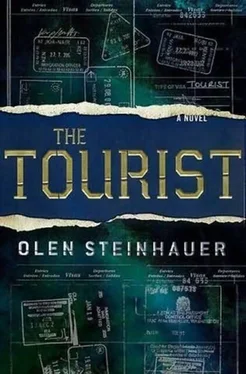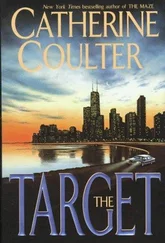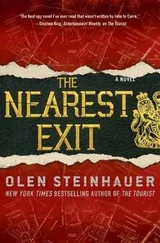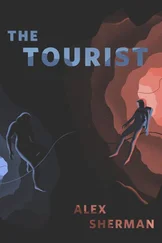"Here it is," Einner said.
Milo blinked at the sheet being held out for him to read. "What?”
“Ugritech. Here."
It was a photocopy of a he Temps article, in French, dated November 4, 2006, that told of Sudanese minister of energy and mining Awad al-Jazz's diplomatic visit to Europe, listing the countries on his agenda. He was seeking investors for a new electrical infrastructure, to replace the one that had been decimated by civil war. In the second column, with a blue ballpoint pen, Angela had circled a meeting between Ugritech director Roman Ugrimov and the energy minister, at Ugrimov's home in Geneva. Present at the meeting were "various American investors." No address given.
There, then, was the connection Angela had found. She was phenomenal.
Milo in turn shared Angela's suspicion that the money used to pay the Tiger had come through Ugritech. Luck, he realized, had played into her calculations-had it not been for that terrible day in 2001, she wouldn't have given Ugritech a second look.
Why, he wondered, hadn't she shared this with him? Was it possible she hadn't trusted him?
"So where does this take us now?" asked Einner.
"Me," said Milo. "I've taken too much from you already."
"You've got me interested now. We've got Sudanese assassinations, tech companies buying them, and disappearing Chinese laptops. What else could a Tourist ask for?"
Milo tempered his arguments so that Einner wouldn't suspect that he was doing this for his own self-preservation, but nothing could convince him. Einner had started, in his words, "a job," and damned if he wasn't going to see it through.
"So, where?"
Milo wondered again if this was all a mistake. Not just bringing Einner along, but this whole chase. It occurred to him that, had he let himself be taken in Disney World, it all might have been wrapped up by now. Grainger's call had left him no time for reflection. He might, at this very moment, have been sitting in his living room, eating ramen noodles and listening to Stephanie's particular take on the world.
But a Tourist soon learns that might-have-beens are a luxury for others. Tourism allows no time for regret, and in fact regret is a plague to the Tourist. So he put his regrets aside and said, "We're going to Geneva. Is the car filled up?"
Einner rocked his head from side to side. "Wait here. I think it's time for a new set of wheels."
Tina sometimes had the feeling that she didn't appreciate things enough. She remembered how she'd been in Venice, of all places, hating the heat and dirt and packs of tourists and-yes-the oppressively heavy baby in her stomach. As if all those constituted the worst the world could dish out. Then she'd met Frank Dawdle and learned that things could get much worse.
She'd let those opening Venice days go by utterly unappreciated. She was a genius at missing what was in front of her, and she wondered if, somehow, she was doing it again here in Austin on a Saturday afternoon.
There were some parallels. Her significant other was gone in a puff of smoke, and she found herself sweating too much on her parents' back porch. Austin heat is not unlike Venice heat in that it's wet, sapping your whole body when you leave the protection of airconditioned houses. And, as in Venice, she was alone, just her and her daughter.
"Lemonade?" asked her mother, sticking her head out the sliding glass door and reminding her she wasn't really alone. Not technically.
"Sure, Mom. Thanks."
"Be right back."
Hanna Crowe closed the door to keep in the artificial cool, and
Tina gazed at the brown crabgrass and two dying poplars recently planted by the privacy fence. This was nothing like Venice. In these suburbs north of Austin, water was a precious commodity, and land spread wide and empty. People lived separated by high fences. This was a completely different world.
Hanna brought an enormous plastic cup full of iced lemonade and sat beside her daughter on the lawn chair. For a while, they just stared at the dead grass. Hanna looked younger than her fifty-six years, her skin permanently pink from the Texas sun. She often wished aloud that she'd been born with her husband Miguel's southof-the-border tan, but just as often praised her daughter's olive complexion for carrying the best of both worlds. Finally, Hanna said, "Haven't heard from him, have you?"
"He won't call again."
"Sure he will."
Tina was annoyed that her mother couldn't, or wouldn't, get her head around this. "He can't, Mom. The Company thinks he's done something wrong, and he needs to show them he's innocent before he can get in touch."
"But just one call-"
"No, Mom. One call, and they trace his location like that," she said with a snap of her fingers. "He can't risk it yet."
Her mother smiled sadly. "You know what it sounds like, don't you?"
"Yeah, I know. Paranoia." Hanna nodded.
"But it's not. You've seen the sedan parked over in front of the Sheffields', right? I pointed it out to you."
"Friends of the Sheffields, I'm sure."
"Then why don't they get out of the car, Mom?"
Ever since arriving two nights ago, Tina had been unable to impress her mother with these details. Her father got it, so why couldn't she?
"Well," said Hanna, "it's nice to have you here. We haven't seen Stephanie in months."
Tina closed her eyes. How, really, could she expect her mother to understand? Both her parents knew Milo worked for the CIA, but they believed he was an analyst of some type, dealing with classified information that precluded him ever discussing his job over family dinners. They certainly never learned the true story behind their first meeting, never knew that he had been the kind of Company employee who sometimes carried a gun and even had clearance to use it.
The men who shared time in the sedan by the Sheffields' worked for the woman who had abruptly ended their vacation. Special Agent Janet Simmons. Though her initial impression had been that Simmons was probably the biggest bitch she'd ever met, now, with a few days' distance, she could recall how Simmons had been trying to show Tina how reasonable she was. "Yes, I think he murdered Angela Yates and another person. That's why I want to bring him in. But why would he run, Tina? Can you tell me that?"
"No, I can't."
"Exactly, Tina. If he's innocent, I'm all for hearing his version. But I need him in front of me." She shook her head, and her wandering eye fixed on the far wall. "This sudden escape doesn't look good at all. Maybe you know something you're not telling me? Maybe you know where he's gone?"
Tina, with all honesty, admitted she knew nothing, and over the past days she'd wondered just how little she knew at all. Even petty Patrick had his suspicions. Was that because he was such a miserable, self-pitying man, or was it because he could see what she was blind to?
Her mother was saying something that ended with "… fresh tortillas right off the grill.”
“What was that?"
Hanna Crowe smiled and rubbed her daughter's forearm. "That new restaurant off 1-35. I was thinking we'd go tonight. What do you think?"
"Sure, Mom. That sounds good."
Miguel Crowe had been considered a big man from the time he turned nineteen and won a scholarship to the University of Texas to study engineering. Once he'd arrived in Austin from Guadalajara, he began planning for his future, making contacts with the oil company recruiters who visited twice a year. By the time he graduated, he had negotiated a position with Exxon Mobil in the Alaskan fields, bringing along his new wife, Hanna, who quit her comparative literature studies to follow her husband north. Tina was born in Nome, but by the time she was six, they had moved back to the corporate headquarters in Irving, a suburb of Dallas. He was the only Mexican national ever to have joined the board of directors when he took early retirement in 2000, amid a wave of national hatred for oil conglomerates.
Читать дальше
Конец ознакомительного отрывка
Купить книгу












